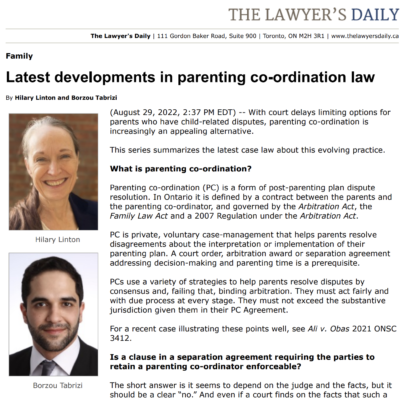This is part one of a two-part series. It was originally published on August 29, 2022 by The Lawyers Daily. In part two, we will provide more case law regarding parenting co-ordination.
By Hilary Linton and Borzou Tabrizi.
With court delays limiting options for parents who have child-related disputes, parenting co-ordination is increasingly an appealing alternative.
This series summarizes the latest case law about this evolving practice.
What is parenting co-ordination?
Parenting co-ordination (PC) is a form of post-parenting plan dispute resolution. In Ontario it is defined by a contract between the parents and the parenting co-ordinator, and governed by the Arbitration Act, the Family Law Act and a 2007 Regulation under the Arbitration Act.
PC is private, voluntary case-management that helps parents resolve disagreements about the interpretation or implementation of their parenting plan. A court order, arbitration award or separation agreement addressing decision-making and parenting time is a prerequisite.
 PCs use a variety of strategies to help parents resolve disputes by consensus and, failing that, binding arbitration. They must act fairly and with due process at every stage. They must not exceed the substantive jurisdiction given them in their PC Agreement.
PCs use a variety of strategies to help parents resolve disputes by consensus and, failing that, binding arbitration. They must act fairly and with due process at every stage. They must not exceed the substantive jurisdiction given them in their PC Agreement.
For a recent case illustrating these points well, see Ali v. Obas 2021 ONSC 3412.
Is a clause in a separation agreement requiring the parties to retain a parenting co-ordinator enforceable?
The short answer is it seems to depend on the judge and the facts, but it should be a clear “no.” And even if a court finds on the facts that such a clause is binding on the parties, any resulting awards are not.
Parenting co-ordination is “secondary arbitration” as defined by the Family Law Act and the Arbitration Act. Regulation 134/07 under the Arbitration Act sets out the prerequisites for all family arbitration agreements to empower family arbitrators to deliver enforceable awards.
These prerequisites are not mere formalities as some courts have characterized them. Among other things, they require arbitrators to provide a specified form of screening for power imbalances and family violence before the parties commit to the process. And they require arbitrators to certify that they will continuously reassess those dynamics if they conduct any arbitrations.
Screening in any private dispute resolution process, particularly one involving children, is critically important.
If the prerequisites are not met, the Arbitration Act and Family Law Act together state, definitively, that the agreement is not a “family arbitration agreement” and the awards resulting from that process will not be enforceable by a court.
Therefore, an agreement to retain a parenting co-ordinator set out in a separation agreement will not produce enforceable awards, even where the parties and arbitrator have subsequently acted on that agreement, unless they have executed an arbitration agreement that complies with the Regulation.
This makes sense. If the parents have not been screened for power imbalances and family violence in the manner stipulated by the Regulation, it is not appropriate for a court to subsequently compel them to participate in that process or be bound by its outcome, regardless of their actions.
The costs of a failure to meet the statutory and regulatory requirements should not be borne by the parties.
It is understandable that courts might want to hold parties to their apparent commitments and to avoid the resulting unfairness where a parenting co-ordinator or arbitrator has not required them to comply with the prerequisites. But the legislation and Regulation are clear. Further, family arbitrators are required by the Regulation to take specified training to learn these requirements and to certify that they have been followed.
The fallout from an arbitrator’s failure to do so was keenly illustrated in a 2022 decision, Shinder v. Shinder 2022 ONSC 181. In that case, the parties’ separation agreement anticipated future mediation-arbitration of designated disputes. A dispute arose, and a mediator-arbitrator was confirmed via correspondence between counsel. But no arbitration agreement was signed and there was no screening for power imbalances and family violence.
The parties attended a mediation at which they agreed to appoint the same arbitrator to summarily arbitrate future disputes arising from that settlement. Again, no arbitration agreement was executed and there was no screening for family violence and power imbalances.
Notwithstanding, the court considered the language of the statutes and Regulation and determined that, by their actions, the parties and the arbitrator had entered into a binding arbitration agreement.
This outcome is problematic as it fails to acknowledge the important reasons for the mandatory procedural requirements. And it leaves the parents with an order binding them to a process that leads to unenforceable awards.
A better approach is for courts to require family arbitrators to comply with their responsibility under the Regulation to ensure their clients execute family arbitration agreements that include the required terms, with independent legal advice, and to be satisfied that all mandatory prerequisites have been met before they do so.
That approach was taken in Monteiro v. Monteiro 2022 ONSC 2642, where the court, adopting the reasoning in the 2017 decision of Horowitz v. Nightingale 2017 ONSC 2168, wrote:
The Regulation is mandatory and applies to all secondary arbitrations. The dispute resolution clause contained in the separation agreement does not contain the necessary formalities and therefore does not constitute an arbitration agreement for purposes of the Arbitration Act. … This court is without jurisdiction to read into the dispute resolution clause the formalities required by the Regulation. Consequently, a failure to comply with the requirements of the regulation is fatal to the enforcement of the arbitration provisions contained in the dispute resolution clause (of the separation agreement.)

